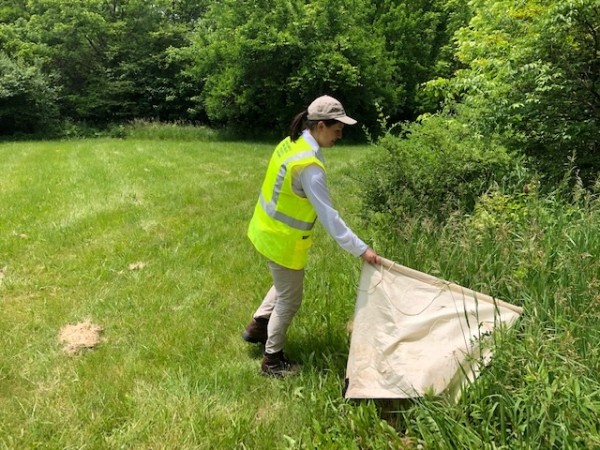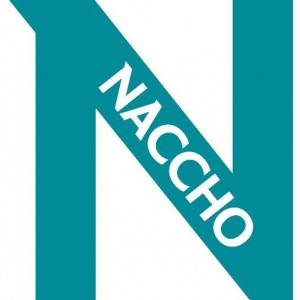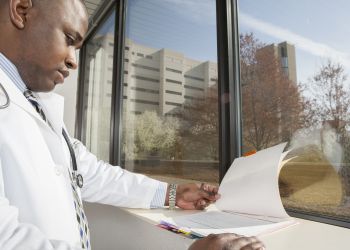This Story From the Field is from Franklin County Public Health Department, Ohio. For more information, please contact: Sarah Fink ([email protected]). Phone: 614-525-7445.
Suffolk County (NY) mentored Franklin County (OH)’s new tick surveillance program as part of NACCHO’s Vector Control Collaborative. COVID-19 travel restrictions did not stop the expansion of tick species, nor did they stop this virtual mentorship. FaceTime tick dragging is a socially-distanced and low-cost way to receive technical assistance for field work.
Ohio has seen new species of ticks and increases in tick-borne diseases over the past decade, yet minimal resources are directed toward tick surveillance. As the Blacklegged tick (the vector for Lyme disease) expands east across the state, residents of heavily populated Franklin County are ill-prepared to recognize and take preventive measures against the much smaller species with a higher disease burden. The Lone Star tick, the Gulf Coast tick, and the Asian longhorned tick have also recently made their home in the Buckeye State, bringing new pathogens with them.
Franklin County Public Health (FCPH) needed assistance designing an active tick surveillance program. Active surveillance monitors changes in the abundance and distribution of ticks, plus the presence and prevalence of their pathogens. This actionable, evidence-based information guides outreach and intervention efforts to the public, clinicians, and local partners such as park systems. Any person spending time outdoors is at risk of tick bites; therefore, a tick surveillance program became an even higher priority as residents flocked to their backyards and parks during the pandemic. Unfortunately, few health departments within the state have robust tick surveillance programs that can serve as a model. FCPH faced a challenge in shifting their newly started, but sporadic tick dragging to a more formalized program.
FCPH’s Community Environmental Health section applied to NACCHO’s Vector Control Collaborative (VCC) Mentorship Program in early 2020 with the hopes of being connected with a mentor who could provide tick surveillance-related technical assistance. NACCHO did not disappoint. FCPH was teamed up with Dr. Scott Campbell, Chief of the Arthropod-Borne Disease Laboratory at Suffolk County Department of Health Services in New York. Originally, the VCC included funding for site visits between the mentor and mentee, but when out-of-state travel became impossible due to the pandemic, the pair had to get creative. NACCHO facilitated the transition to a virtual mentorship and expanded the timeframe to accommodate the additional workload the pandemic created for both health departments. FCPH established three goals: develop a written surveillance plan with standard operating procedures (SOPs); explore tick control and other interventions; and expand public outreach including updating their tick website.
Between phone calls, emails, and the occasional FaceTime in the woods, FCPH learned about the nuances of tick collection, details of Suffolk County’s surveillance program, and ideas for public education and outreach. Even though FCPH was unable to conduct tick surveillance in as many locations and as frequently as they had hoped in 2020, the SOPs were developed to ensure future collection methods would be consistent and provide quality data for tracking tick populations over time. Dr. Campbell also provided useful long-term suggestions for the sustainability of the program, such as identifying potential local partners and increasing collaboration with universities and other researchers. Dr. Campbell’s advice to store specimens and samples despite no current capacity for pathogen testing has already paid off. FCPH is awaiting much needed baseline pathogen data from the Centers for Disease Control and Prevention (CDC) in exchange for submitting collected ticks for use in research evaluating a new method for identifying ticks and pathogens with one test. This year, FCPH also enlisted the help of interns from the Ohio State University in a partnership that will hopefully continue to grow. Improvements to the tick website are underway and FCPH’s new environmental health educator will assist with creating more tick education materials. Check out FCPH’s old tick website for more information.
Lessons Learned
When faced with a new species or disease in your area, health departments should consult other programs with experience. Suffolk County has collected Blacklegged ticks for decades and was able to share their fine-tuned methods with Franklin County. Dr. Campbell expressed that helping FCPH start its program from scratch provided a useful lens that allowed him to step back and evaluate what has and has not worked for his own program. For a virtual mentorship such as this one, it was vital to see the actual fieldwork being done even if it was via FaceTime. The virtual format was more flexible so fieldwork observations could easily be rescheduled in the event of bad weather or other extenuating circumstances. Besides time, minimal resources were needed for this mentorship so it could easily be replicated for any agency looking for individualized technical assistance.







